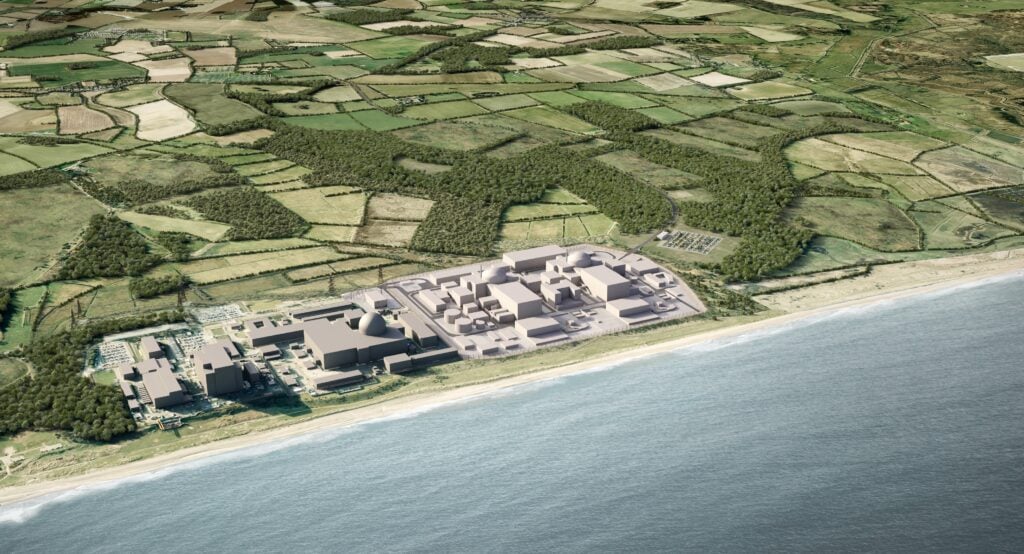EDF Energy’s 3.2GW nuclear power station Sizewell C has progressed into the construction phase after securing a development consent order (DCO).
Situated on the Suffolk coast, Sizewell C was granted building permission in July 2022, which begun a series of financial commitments from both EDF Energy and the UK government.
This new phase triggers a £250 million funding package, which will be made available as the project reaches various stages of construction.
£23 million of the funding is allocated for community projects, £100 million for the environment, £12 million to support local tourism and a £12 million housing fund to boost private housing and tourist accommodation.
In September 2023, the UK government and EDF launched an equity raise process to attract private investors into the project, from which they expect a final decision later in 2024.
Sizewell C is however projected to bring £4.4 billion of investments to the local area, helping deliver 1,500 apprenticeships and at least 2,300 local jobs at peak construction.
Julia Pyke and Nigel Cann, joint managing directors at Sizewell C, said in a joint statement: “This is a significant moment for our project in Suffolk and a big step for British energy security. We’ve had a really successful year of pre-commencement works on site, and we’ve been working hard with local partners and organisations to ensure we’re ready to take this next step for the project.”
Sizewell C’s bottomless piggy bank
This announcement is the latest chapter in an encyclopaedic history of funding and support for the development of Sizewell C and, ultimately, a domestic nuclear energy industry.
The project first raised eyebrows after a “historic” £700 million investment from the UK government in November 2022.
This aimed to secure energy security and was partially a reaction to the onset of Ukraine-Russia conflict, as the government reprioritised self-reliance in the energy industry.
Then, in July 2023, the government launched Great British Nuclear (GBN), a trade body dedicated to reaching the nation’s goal of 24GW nuclear power production by 2050, primarily via the development of small modular reactors (SMRs) – advanced nuclear reactors that have a power capacity of up to 300MW per unit.
The technology is much smaller than conventional nuclear reactors and thus are cheaper to create and crucially, can be constructed much faster.
Alongside GBN’s launch, the government also announced £157 million of funding for nuclear projects across the country.
Of the £157 million financial package, £77.1 million was allocated to accelerate advanced nuclear business development and £58 million was assigned to further the development of advanced modular reactors.
Later in the same month, the UK government committed a further £170 million for the development of Sizewell C specifically, primarily to aid procurement of key components and future construction.
In August 2023, government ministers announced an additional £341 million of previously allocated funding to accelerate Sizewell C preparations.
This brings government funding for Sizewell C in 2023 alone to £668 million, excluding the £700 million provided in late 2022.
Most recently, in January 2024, EDF Energy invested £1.3 billion into sustaining the UK nuclear energy output across its five generating power stations, located in Suffolk, Torness, Hartlepool, and two in Heysham.
These stations generated over 35% more electricity throughout 2023 than initially forecast at the time of acquisition, with the extra output coming in at 212TWh.
Despite clear government enthusiasm for a growing domestic nuclear energy industry, some industry members question whether the low-carbon choice should be prioritised over 100% renewable options, like wind and solar.
As previously quoted by Current+, Jess Ralston, head of energy at the Energy and Climate Intelligence Unit (ECIU), said: “Despite slight cost increases given current inflation levels, British renewables will remain much cheaper than both gas and nuclear.
“There are questions over whether government has taken its eye off the ball for the current Contracts for Difference (CfD) auction round for wind farms, imposing too tight restrictions and so limiting the projects that might get built.”





